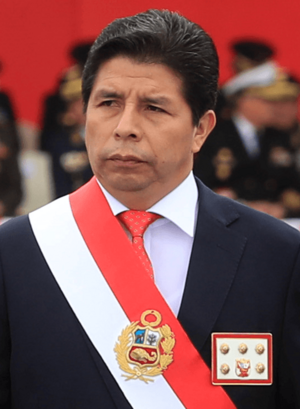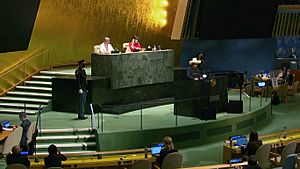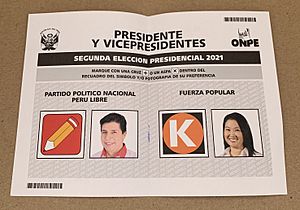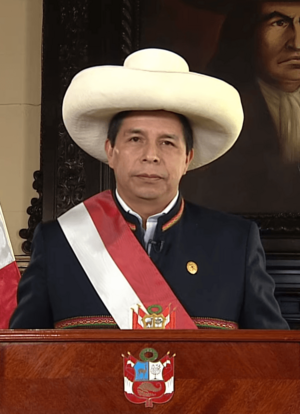Pedro Castillo facts for kids
Quick facts for kids
Pedro Castillo
OSP OCA
|
|
|---|---|

Castillo in 2022
|
|
| 63rd President of Peru | |
| In office 28 July 2021 – 7 December 2022 |
|
| Prime Minister | Guido Bellido Mirtha Vásquez Héctor Valer Aníbal Torres Betssy Chávez |
| Vice President | First Vice President Dina Boluarte Second Vice President Vacant |
| Preceded by | Francisco Sagasti |
| Succeeded by | Dina Boluarte |
| Personal details | |
| Born |
José Pedro Castillo Terrones
19 October 1969 Puña, Peru |
| Political party | All for the People (since 2024) |
| Other political affiliations |
|
| Spouse |
Lilia Paredes
(m. 2000) |
| Children | 2 |
| Education | César Vallejo University (BA, MA) |
| Signature |  |
José Pedro Castillo Terrones (born 19 October 1969) is a Peruvian politician, former elementary school teacher, and union leader. He served as the President of Peru from 28 July 2021 until he was removed from office on 7 December 2022.
Castillo was born into a poor peasant family in the Cajamarca region of Peru. As a teenager, he worked to pay for his education. He later returned to his hometown to become a primary school teacher. He became well-known as a leader during a national teachers' strike in 2017.
He decided to run for president in the 2021 election after seeing the struggles his students faced in rural Peru. He won the election with strong support from people in rural areas. He was sworn in as president on 28 July 2021.
During his presidency, Castillo faced a lot of opposition from the Peruvian Congress. He appointed several different governments in a short time. On 7 December 2022, facing removal from office, Castillo tried to dissolve Congress and rule by himself. This was seen as an illegal move. Congress removed him from the presidency that same day. He was then detained. His vice president, Dina Boluarte, took his place as president.
Contents
Early Life and Teaching Career
Pedro Castillo was born in Puña, a village in the Cajamarca region of Peru. His parents were poor peasants who could not read or write. Even though Cajamarca has South America's largest gold mine, it is one of Peru's poorest regions. Pedro was the third of nine children.
As a child, Castillo had to walk for two hours along steep paths to get to school. He also helped his family with farm work. To earn money for his studies, he and his father would travel far to work on coffee farms. He also sold ice cream and newspapers in Lima, the capital city.
Castillo earned a degree in Primary Education and a master's degree in Educational Psychology from César Vallejo University. Starting in 1995, he worked as a primary school teacher and principal in his hometown of Puña. Besides teaching, he also cooked for his students and cleaned the classroom.
Start in Politics
Castillo first ran for a local office in 2002 but was not successful. He became a well-known leader during a big teachers' strike in 2017. The strike was about getting better pay and more money for education. Teachers from all over Peru marched in Lima.
After the strike, several political parties asked him to run for Congress, but he refused. Instead, he decided to run for president. He said he was motivated by seeing his students struggle without basic resources, like cell phones or tablets for remote learning during the COVID-19 pandemic.
2021 Presidential Election
Castillo ran for president as the candidate for the Free Peru party. At the start of the campaign, not many people knew who he was. But his popularity grew quickly, especially in rural areas. He connected with voters who felt ignored by the government in Lima.
His campaign focused on health, education, and farming. He also promised to create a new constitution for Peru. He believed the current one, written in 1993, caused economic inequality.
Winning the Election
Castillo surprised many by winning the first round of the election with 18% of the vote. He then faced Keiko Fujimori in the second round. It was a very close race.
Castillo won the election, becoming the new president of Peru. His victory was seen as a rejection of the country's traditional political leaders. Many poor and rural Peruvians saw him as a symbol of hope. However, his election worried some business leaders and wealthy people.
Presidency (2021–2022)
Castillo officially became president on 19 July 2021. He had little political experience, and his government faced many challenges. In his first six months, he had four different cabinets of ministers. This was due to disagreements and controversies.
Castillo's government struggled to get things done because his party did not have a majority in Congress. He eventually left the Free Peru party in June 2022 to govern as an independent.
Domestic Policy
Castillo's government focused on helping poor families. He announced funding to provide food for those in need. He also launched a program to help small farmers and increase local food production.
In November 2021, he announced an increase in the minimum wage. He also said he would sell the presidential jet and ban first-class travel for government officials to save money.
In early 2022, prices for fuel and fertilizer went up around the world. This caused high inflation in Peru, and many people protested. This shifted some of the support he had in rural areas.
Foreign Policy

As president, Castillo traveled to Mexico and the United States. He met with foreign investors and leaders from other countries. At the United Nations, he called for a global agreement to make sure everyone in the world could get COVID-19 vaccines.
He also worked with other South American leaders on issues like the Venezuelan migrant crisis. However, the Peruvian Congress, which often opposed him, sometimes blocked him from traveling abroad for official duties.
Removal from Office
Castillo's presidency was marked by constant conflict with Congress. Opposition parties tried to remove him from office three times through a process called impeachment. The first two attempts failed.
On 7 December 2022, just before Congress was set to vote on a third impeachment attempt, Castillo made a televised announcement. He said he was dissolving Congress and would rule by decree. This action was immediately called a "self-coup" and was considered illegal by most of his own ministers and government officials.
Hours later, Congress held its impeachment vote and removed Castillo from the presidency. He was detained by police shortly after. His First Vice President, Dina Boluarte, was sworn in as the new president.
After he was removed, some countries like Mexico and Colombia continued to recognize Castillo as the rightful president. However, most countries, including the United States and Spain, recognized Dina Boluarte's government.
Political Views
Castillo has been described as a socialist on economic issues but socially conservative. This means he supports more government control of the economy but holds traditional views on social topics.
He is against same-sex marriage and has opposed teaching about gender equality in schools. These views are similar to those of his right-wing opponents.
During his campaign, he promised to rewrite Peru's constitution to reduce economic inequality. He also said he would not nationalize private companies but would renegotiate tax deals with large corporations. After becoming president, he softened some of his more radical ideas.
Personal Life
Castillo is married to Lilia Paredes, who is also a teacher. They have two children. Castillo is Catholic, while his wife and children are evangelical Christians.
He is known for often wearing a traditional wide-brimmed straw hat called a chotano, a poncho, and sandals made from old tires. This style helped him connect with his rural supporters. His family lives on a farm where they raise animals and grow crops.
Electoral history
| Year | Office | Type | Party | Main opponent | Party | Votes for Castillo | Result | Swing | ||||||
|---|---|---|---|---|---|---|---|---|---|---|---|---|---|---|
| Total | % | P. | ±% | |||||||||||
| 2002 | Mayor of Anguía | Municipal | Possible Peru | José Alberto Yrigoin | National Unity | 104 | 8.82% | 4th | N/A | Lost | N/A | |||
| 2021 | President of Peru | General | Free Peru | Keiko Fujimori | Popular Force | 2,724,752 | 18.92% | 1st | N/A | N/A | N/A | |||
| General (2nd round) | 8,836,380 | 50.13% | 1st | N/A | Won | Gain | ||||||||
Awards
See also
 In Spanish: Pedro Castillo para niños
In Spanish: Pedro Castillo para niños
- List of Peruvians
- Bruno Pacheco
 | William M. Jackson |
 | Juan E. Gilbert |
 | Neil deGrasse Tyson |



